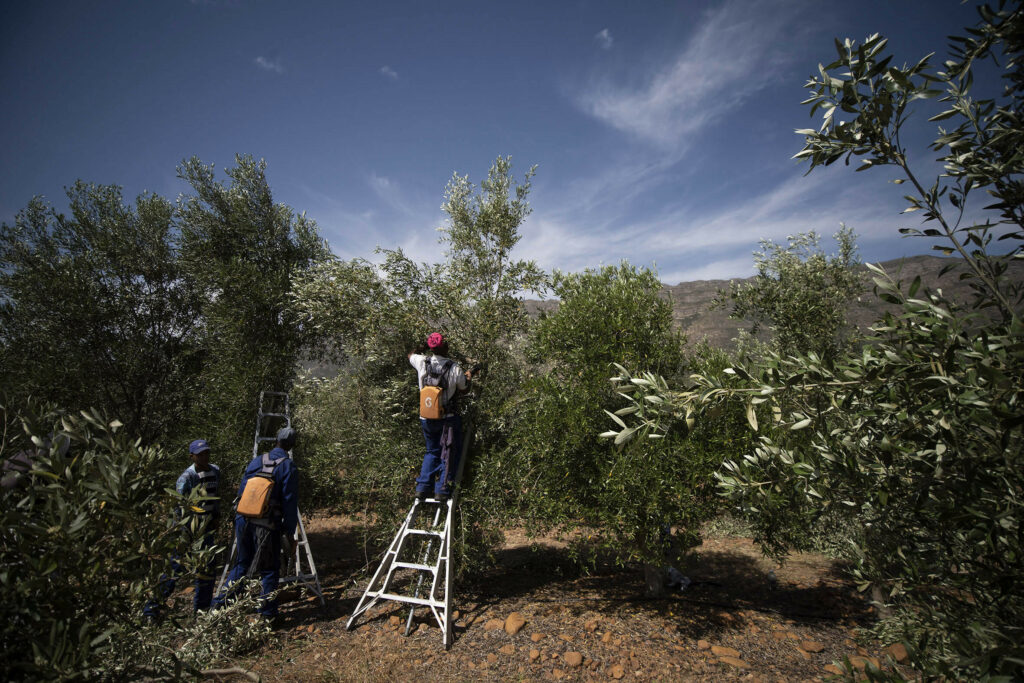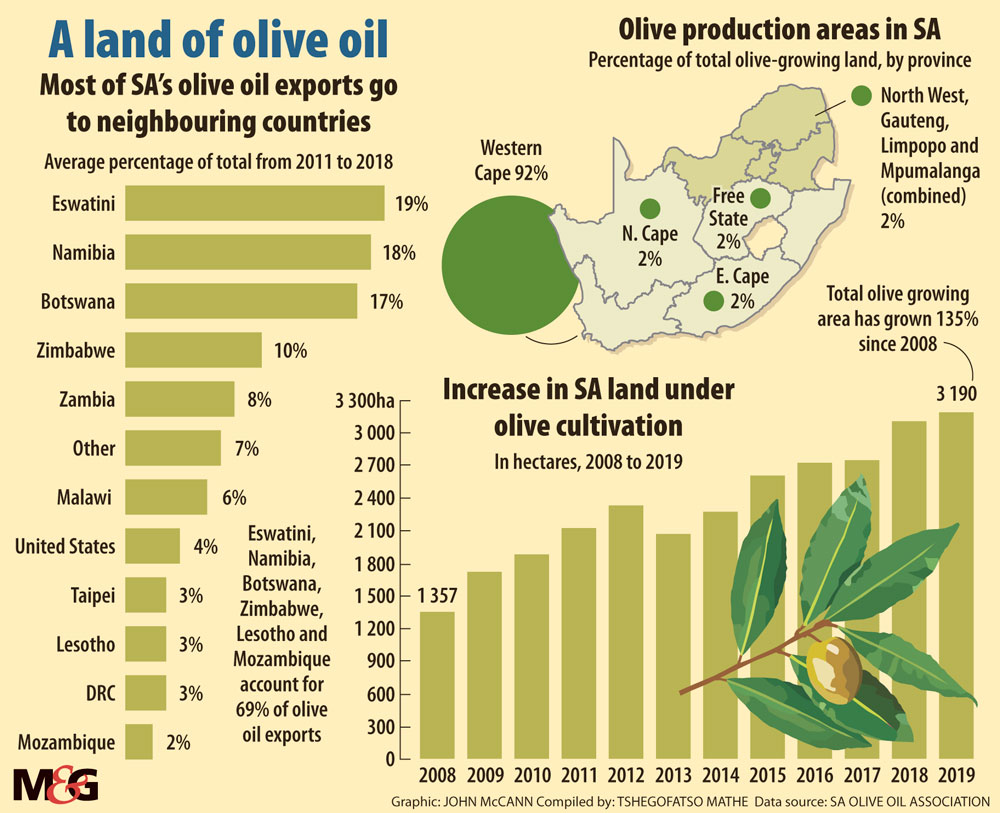Emerging farmer: Loyiso Mango collects pallets of bottled olive oil, which is made from hand-picked olives grown on Willie Duminy’s Wêreldsgeluk olive farm near Porterville. Mango has not yet been able to raise the capital to buy his own land to farm his own olives. (David Harrison/M&G)
Experts and aficionados recount the story of how olive oil arrived in South Africa. The story goes that a man named Piet “California” Cillié brought olive trees from California in 1893.
At about the same time, a young immigrant from Genoa in Italy, Ferdinando Costa, saw the potential of the climate and soil in the Western Cape and started planting olive trees on a farm in Paarl. As a result, most of South Africa’s olive oil is farmed in the province’s Mediterranean climate.
Today there are 178 growers and the industry employs about 14 000 workers. It is hard work as most of the harvesting is done by hand.
But Eastern Cape-born Loyiso Manga has set his sights on being one of the few who break into the oil business. This week, he saw his last day inside a cubicle in the sales consulting world.
For the past few months, he has been trying to get a grip on selling his brand of olive oil. Having grown up on a farm, he has always longed to work on his own land and be in the farming business.
Manga, who is based in the Western Cape, started to sell his Ubuntu extra virgin olive oil last December from the boot of his car to chefs and ordinary South Africans. The 500ml bottle, sold at R130, contains olive oil that is medium fruity with aromas of green herbs, roasted vegetables, tomatoes and green banana. It also has a lingering spiciness and nutty aftertaste.
 Willie Duminy’s Wêreldsgeluk olive farm near Porterville. (David Harrison/M&G)
Willie Duminy’s Wêreldsgeluk olive farm near Porterville. (David Harrison/M&G)
Within a month, Manga had sold more than 400 bottles. He knew it was a viable business.
He named it Ubuntu, which forms part of the Zulu phrase “Umuntu ngumuntu ngabantu,” meaning, “I am because you are.” His vision was to create a product that will appeal to everyone.
“I needed a name that anyone can identify with no matter what race or culture they belong to. I believe that most South Africans understand what it means, even if they might pronounce it differently. They know it denotes having care, compassion and being empathic.”
Manga’s oil is made using a cold-press extraction method. The olive oil is extracted with a hydraulic press machine. The procedure should have minimum water and exposure to oxygen. He uses mainly Frantoio, Coratina, Mission and Leccino olive tree cultivars to provide aroma and flavour.
Despite its history, South Africa’s olive oil yield is smaller than other countries. The International Olive Council estimates that for the 2019‑20 crop year more than three million tonnes of oil will be produced but only 1% of that will be produced in South Africa.
The rest of the olive oil we use in South Africa is imported mainly from Spain and Italy. Karien Bezuidenhout, manager of the South African Olive Industry Association, says that they estimate that locally produced olive oil supplies one third of local consumption, while two thirds are imported.
Though the industry is small, this is not necessarily a negative because it allows farmers to pay attention to detail and produce an “excellent” quality product, Bezuidenhout says, adding that this is proven by the international awards local oil producers often get.
Paul Makube, a senior agricultural economist at FNB, says that while South Africa remains a net importer, production is gradually improving to meet local demand. “There is still room for growth in production for import substitution. However, limited consumer knowledge on olive products remains a challenge as it is still regarded as a luxury item,” he explains.
From the moment the olives are picked from the tree, farmers then use modern machinery and the cold-pressed extraction process to produce the extra virgin olive oil. There is no chemical process involved.
Bezuidenhout says due to the small size of the industry they have to compete with cheap imports.
“European producers get a lot of support from their governments and therefore they can produce a much cheaper extra virgin olive oil. In South Africa, we do hand-harvesting and we don’t get much government support so the end product is more expensive,” she says.
Besides competing with imports, Manga has to contend with a
much more fundamental issue when it comes to producing his oil: land.
As an aspiring farmer, he does not own his own land, but instead buys and brands his oil from another farmer.
His issue is not unique.
Last month, the Mail & Guardian reported that emerging farmers in KwaZulu-Natal struggle to get into farming in the country because of lack of access to land and capital.

Therefore, Manga gets his olive oil from a farm in the Bergrivier municipality in the Western Cape, which is owned by Willie Duminy. He met the farmer while he was scouting for a farm to buy. Without sufficient capital, Manga has still not been able to buy his own land.
Duminy produces four kinds of olive oil — one is sold to Manga which he then sells under his Ubuntu brand.
He has also tried to get his oil onto the retail shelves for the last four months without success. “My biggest frustration is that I do not understand why it’s so difficult for these guys to accept it onto their shelves — a product like mine, which is black-owned,” Manga says.
“Why is it difficult to put my product on the shelves, which are already full of products that have been there for years?”
Tshegofatso Mathe is an Adamela Trust business reporter at the M&G